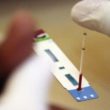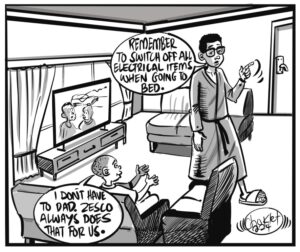United States of America Ambassador to Zambia Daniel Foote has pledged his country’s continued support to Zambia’s health sector.
Speaking during the launch of the ‘Growing Expertise in E-Health Knowledge and Skills (GEEKS) Program at the University of Zambia, Tuesday, Ambassador Foote said the U.S was committed to continue working with the Ministry of Health and Smart Zambia to expand health information in the country.
“I am honored to be part of this gathering as we launch the GEEKS training in Zambia. GEEKS, which stands for Growing Expertise in E-Health Knowledge and Skills, is a new cross-cutting program that uses health information and communications technology to deliver quality health services and improves the use of data in decision making to strengthen health systems. I am glad that we are able to better leverage technology to provide quality health services to men, women and children in Zambia. The U.S government, working in partnership with the government of the Republic of Zambia, through the Ministry of Health and Communications technologies to improve the quality of patient care,” Ambassador Foote said.
“The U.S government remains committed to working side by side with the Ministry of Health and Smart Zambia to expand health information capacities in the Zambian health care delivery system. This partnership was recently demonstrated at the launch of the Chipata District hospital, which operates now on a paperless basis by electronic health records. We are proud to announce that Zambia is the first country in Africa to launch the GEEKS program, with Thailand being the inaugural site. Starting this initiative here underscores our strong bilateral relationship with the Zambian government, particularly in the health sector, and its role in leading the way for the Africa CDC in the Southern Region.”
He stated that the United States of America would continue supporting Zambia in the fight against HIV through providing financial assistance.
“The U.S government with funding from PEPFAR, through the U.S. Centers for Diseases Control and Prevention (CDC Zambia) and other U.S government agencies, continues to support the implementation of HIV prevention and treatment programs to help Zambia achieve HIV epidemic control. Since 2004, the U.S government has contributed more than $3.5 billion towards Zambia’s fight against HIV. PEPFAR funding has helped save the lives of infections for hundreds of thousands more, and strengthened health systems so that Zambians can receive quality health services,” he said.
“CDC Zambia, with PEPFAR funds has made significant investments in health information systems, including the national electronic health record system SmartCare. To date, approximately 2.2 milion people are enrolled in the system at over 900 health facilities nationwide. The GEEKS Program that we are launching today builds on the U.S. investments in the SmartCare to support progress towards the 95-95-95 PEPFAR goals, through the use of individual electronic health records to improve the quality of patient care by health care providers.”
Ambassador Foote said he was certain that the sustainability of the e-health program was guaranteed.
“Zambia is becoming the first informatics capacity development collaboration between three CDCs: Africa CDC, U.S. CDC, and the China CDC together with the Zambian Ministry of Health, the University of Zambia, the Zambia National Public Health Institute and many others taking part in this GEEKS training. With such collaboration, I am certain the sustainability of eHealth can be guaranteed. Zambia is the Regional Collaborating Center for Africa CDC and this GEEKS training presents an initial step in growing the health information workforce capacity to create a Regional Center of Excellence for Southern Africa,” said Ambassador Foote.
And Ministry of Health Permanent Secretary in charge of training Professor Elywn Chomba thanked the United States and Chinese governments for their continued support to her ministry.
“May I take this opportunity to acknowledge the support of the American and the Chinese governments in driving the developmental agenda of Zambia on behalf of the Ministry of Health and the Zambian government. I wish to thank you for your continued technical and financial support you have given to the country, both governments have been very supportive in training, technical support and financing. As the ambassador has alluded to, we should continue to build on what we have learnt to realise a Smart Zambia. Zambia is going through a national transformation agenda and to actualize that, a Smart Zambia is a vision,” said Prof Chomba.
And University of Zambia Deputy Vice-Chancellor Professor Enala Mwase noted that information and communication technology could be used to improve health care delivery.
“It is a well-known fact information and communication technology can be used to improve quality and safety of health care and to lower costs of health services. At present however, there is a global shortage, more especially in developing countries, of skilled individuals who have the technical skills to use this technology to improve health care. In addressing this gap in the health informatics workforce will require identifying and developing the skills, training and competencies that will be needed to realise the full benefits of these technologies to improve health care,” Prof Mwase.
“The University of Zambia as stated in its 2018-2022 strategic plan, stands ready to enhance existing partnerships and to develop new partnerships to advance research, knowledge generation and service to the community as well as the industry. The University of Zambia therefore welcomes the move by the School of Natural Sciences through the Department of Computer Science to collaborate with the Centre for Disease Control and Prevention (CDC) and partners to conduct training under the GEEKS programme. We are therefore delighted to be associated with this training. Through this training, the University of Zambia will be able to demonstrate its support to the overall goals of the Ministry of Health for e-health capacity development and the larger goal to develop Zambia’s workforce in this particular area.”












